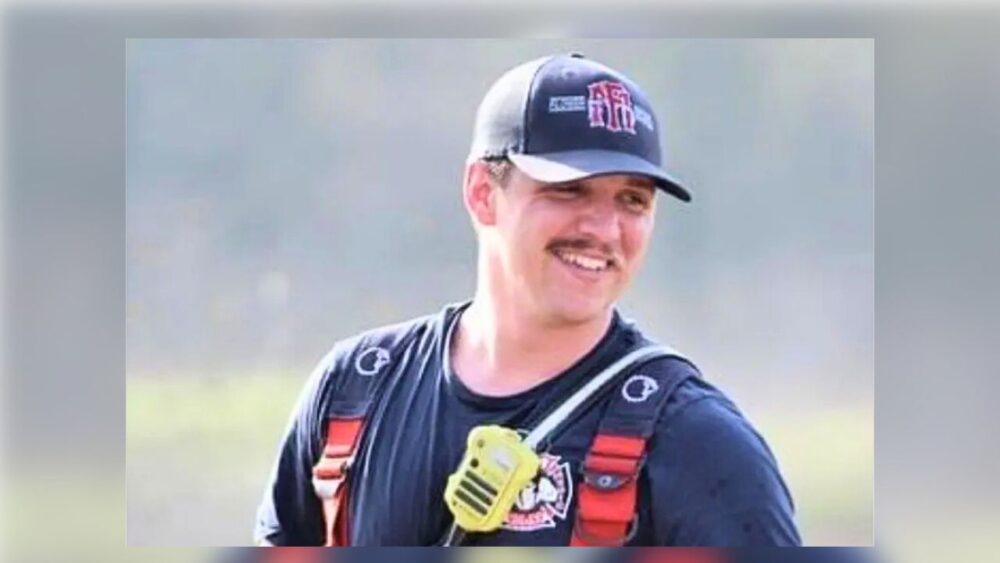A sweeping bill to mandate potentially life-saving cancer screenings for Texas firefighters is one signature away from becoming law.
The Wade Cannon Act—known formally as House Bill 198—passed both chambers of the Texas Legislature on May 19 and now awaits the governor’s approval. It caps off a multi-year effort by firefighter associations and lawmakers who say early detection is crucial to saving lives.
Named after Wade Cannon, a Flower Mound firefighter who died in 2022 at age 33 from colorectal cancer, the bill would require political subdivisions that employ firefighters to offer occupational cancer screenings at no cost.
Screenings would begin in a firefighter’s fifth year of service and continue once every year of employment after the initial screening. It would cover urine tests, pulmonary function tests, electrocardiograms, infectious disease screenings, blood tests, chest X-rays, and a variety of cancers, including breast and colorectal.
“Wade’s biggest message he wanted to spread was to get checked,” said Tim Mackling, president of the Flower Mound Professional Fire Fighters Association, who worked alongside Cannon. “He was passionate about early detection and treatment. HB 198 is a win for firefighters all over Texas.”
Cannon’s cancer was not caught early, in part due to health insurance guidelines that typically deny colonoscopies before age 45.
“Unfortunately, Wade was too young for our health insurance to cover his cancer screenings. At 31, you go in for a colonoscopy screening, your insurance tends to deny it. They screen at 45. So, Cannon was caught in a weird situation between health insurance and worker’s comp,” Mackling previously said in House testimony on the bill.
The bill’s momentum has been met with cautious optimism from fire departments around the state.
“We are actually very fortunate in Irving,” said Brian Becker, president of the Irving Fire Fighters Association. “The Fire Department has been offering our personnel medical evaluations, including cancer screenings, for several years now. These screenings have detected cancer early in its development, giving our personnel the opportunity to seek treatment quickly and have successful outcomes.”
Mackling acknowledged that while the bill represents progress, it doesn’t address all the structural gaps firefighters face when battling occupational cancer.
Mackling said HB 198 helps plug holes in insurance coverage but only applies to “presumptive” cancers listed under Texas Government Code 607.055. Other types — such as esophageal cancer, which claimed the life of Flower Mound firefighter James Bobbitt in December — remain uncovered.
“Anything not listed in the presumptive cancer list will still require the employee to show causation between their type of cancer and their job,” Mackling explained. “But this bill allows members who are being denied these tests under our medical insurance to obtain them because of their risk as a firefighter.”
According to Mackling, Flower Mound firefighters have reacted strongly supportively. Since Cannon’s passing, the department has stepped up its internal cancer risk discussions and expanded screening access. In the wake of Bobbitt’s death, Mackling says there has been a dialogue about cancer between department members.
The broader fire community has rallied behind the bill for years, citing alarming data: Firefighters have a cancer rate twice that of the general population, with two-thirds of firefighters expected to receive a cancer diagnosis in their lifetime, according to the International Association of Fire Fighters.
The International Agency for Research on Cancer (IARC) has classified firefighter occupational exposure as a Group 1 carcinogen, putting it in the same risk category as tobacco and benzene.
Supporters also point to the long-term cost benefits. “Catching certain cancers early significantly improves outcomes, and testing is far less expensive than late-stage cancer treatment,” Becker previously told The Dallas Express.
Multiple companies in Texas already offer occupational screening programs, easing potential implementation challenges. Mackling said local systems should be prepared to ramp up quickly if the bill becomes law.
However, the departments do have some time. Unlike most other bills proposed this session, which have an effective date of September 1, 2025, the Wade Cannon Act is slated to take effect June 1, 2026.
Mackling said this gives jurisdictions across Texas more than a year to prepare, providing local fire departments, health care providers, and municipal governments sufficient time to coordinate logistics, secure funding, and ensure compliance with the new screening requirements.
Rep. Ben Bumgarner (R-Flower Mound), who filed the bill in late 2024, previously said his prior attempt failed largely due to timing. This session, HB 198 had an early bill number, broad bipartisan support, and rapid movement through the Senate’s Local Government committee, which voted 6–0 to advance it. It was placed on the chamber’s “Local & Uncontested Calendar” before passing.
Smaller departments — especially in rural or low-tax districts — have worried about how to cover the costs of mandated screenings. “I think we need it, but I’m concerned about how I’m going to pay for that,” one West Texas fire chief testified earlier this year.
For those close to Cannon, however, the legislation is personal.
“Wade would be proud of this,” Mackling said. “He fought hard for early detection even as he battled cancer. This law carries on that fight — not just for him, but for every firefighter in Texas.”


